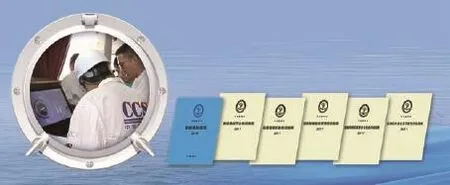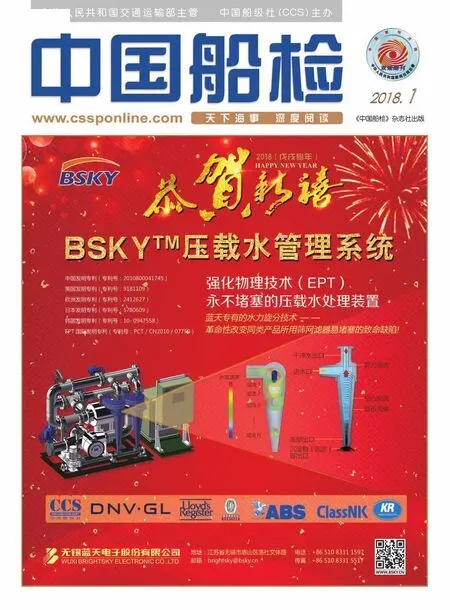IACS five-year strategy:dedicated to more competitive shipping industry
Reporter Xu Miaomiao

become transparent and visualized,regulatory authorities will be able to keep abreast of ship conditions thus reducing time spent on compliance management.
Recently, when IACS's new rotating presidency talked about the developing trend of the shipping industry in the future, he said that with the diversification of fuel and the digitization and interconnection of the ship itself, the ship itself will increasingly adopt digital technology. Also more and more automation techniques, such as robots and 3D printing technology will be adopted in the manufacturing process. In the future, the fleet can be optimized as a whole asset when all ships are interconnected with each other. Also real-time working condition information can be obtained from the ship to make predictions so as to improve its performance while reduce fuel consumption and emissions. With the widespread use of remote monitoring technologies, interventions can be based on the real-time status of the ship and as the ship’s statues
In this new environment of digital development, IACS, as the premier international organization for the formulation and implementation of technical standards for ships, and the non-governmental organization that enjoys an important technical advisory status in IMO,needs to make corresponding adjustments in time to adapt to the new environment. Many of the challenges IACS faces relate to the challenges analyzed in the IMO strategic plan, such as globalization, maritime safety and security, environmental awareness and energy efficiency of ships, new technologies and safety culture.etc. so IACS also needs to make appropriate changes.The above mentioned changes include the transition from paper to e-Cert; the adoption of new methods for ship survey and approval, such as drones and automated image recognition; guidelines for responding to network security threats under the digitized revolution; the identification of requirements in IACS Resolutions which hinder the development of ship's unmanned technology;confirmation that all regulations and regulatory systems support innovation.
Although changes from the external environment have posed a series of challenges to IACS, IACS believes that those challenges are opportunities to consolidate the position of the classification society. In order to meet the challenges and maintain the certain continuity of IACS strategy and support IMO strategic plan, IACS has set the strategic direction for the next five years on the basis of the four pillars, namely leadership, technical knowledge,quality performance and transparency.
According to Liang Jing, deputy director of CCS Technology Management Department, the four pillars of the five-year strategy of IACS have not changed.The innovation is to align the IACS framework with that of IMO more consistently, and at the same time put more emphasis on technology updates and compliance.According to the value and guiding principle of IACS,the strategic direction of IACS in the following five years mainly includes the following aspects. In the area of new technology coordination, IACS remains committed to contributing to the development of a legal framework that will be able to adapt to new and advanced technologies and practices by maintaining a technology-neutral one, that is, without prejudice or obstructing certain technologies; IACS contributes to the balance between the benefits and impacts of new and advanced technologies in safety as well as other concerns on board and ashore. IACS will support innovation and new technologies by developing a targeted approach that complements the current regulatory requirements, including expanding the traditional role of the classification society to enhance IACS's role in supporting industry safety and environmental protection.
As an important member of IACS, CCS actively responded to and implemented the 5-year strategy proposed by IACS. In order to comply with the trend of technological development and meet the development needs of the industry and itself, CCS attaches great importance to the research and development of forwardlooking technologies while enhances its capability of technological innovation services. CCS technical innovation is mainly reflected in the research and innovation of smart ships and has deepened the research on the application of technology in smart ships and unmanned ships, thus promoting the application of real ships and upgrading the application capabilities of intelligent technologies. It has also conducted R&D on ship network security technology and formulated technical standards for network security to build a ship network security assessment model. CCS not only has proposed the revision of the relevant international maritime conventions/rules and regulations for smart ships/unmanned ships and constructed the framework of technical standards system for smart ships, but also studied the application of virtual reality technology and developed a platform for virtual training and customer experience. CCS has actively carried out application research on new technologies of intelligent testing,researched on wearable ship intelligent inspection technology, deepen UAV application research in ship inspection, and enhanced intelligent inspection and implementation capabilities. CCS will further standardize the norms and standards of international and domestic ships while enhance the advancement, applicability and international application level of standards.

